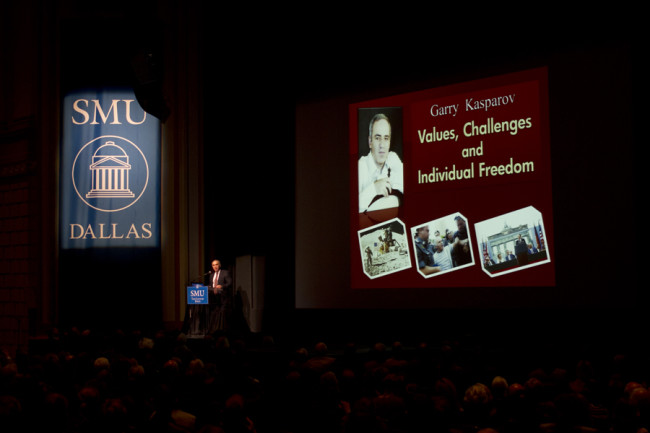
To start his Tate Lecture Tuesday, famed chess player Garry Kasparov cracked jokes about hair loss and heritage. Within 20 minutes, Kasparov compared Russian president Vladimir Putin to a rising Adolf Hitler.
In one of the timeliest Tate Lectures to date, Kasparov, a native of Azerbaijan, then part of the U.S.S.R., spoke of the growing dictatorship of Russia, the plight of the Ukraine, and the West’s duty to make decisions to stop missing opportunities to prevent the past.
“Each time you show weakness, dictators grow stronger. And each time you fail to confront them, the price goes up,” Kasparov said.
Kasparov, who was the youngest World Chess Champion in 1985 at the age of 22, became a pro-democracy activist in 2005 after retiring from chess. As the author of “How Life Imitates Chess,” Kasparov began to view each decision in life, political or financial, with the precision of a chess move.
“Western powers expect to play chess with Putin. But, Putin does not have to play by the rules. He’s a tactician. He allows himself to change the rules whenever he thinks he’s in danger,” Kasparov said. “While the Western powers are obliged to follow regulation, because every decision made by the United States’ president or the prime minister of Great Britain should be somehow confirmed by the respective legislation, Putin can make a decision, he can change a decision.”
If not stopped, Kasparov said, Putin could turn Russia and its surrounding neighbors into a bloodbath.
“We are on to something that is not within our ability to truly predict, but I don’t see Russia in five to 10 years survive within its current geographical borders,” the Russian native said.
To that end, Kasparov urged for the support of the United States in the fight for Ukraine, which fell into turmoil last week after the fall of its government and the Russian invasion, deemed by Putin as military exercises, in Crimea.
“There is no longer credibility in the West. Who is going to believe the president of the United States when he already broke his promise to Syria?” Kasparov asked.
Speaking on President Obama’s soft words to the Russian government, Kasparov showed slides of past American presidents, including Harry Truman and Ronald Reagan, who both stood up to what Kasparov deemed a stronger Russia than today’s Putin-led Russia.
“If President Obama was the president in 1985, I would still be living in the Soviet Union,” Kasparov said.
Describing a shift in American values — from risk to security, from excellence to equivalence, from unity to comfort — Kasparov highlighted the need for the American government to reconsider its priorities and decisions, both internationally
and domestically.
“Today the most pressing topics in Washington are what? National debt and ‘too big to fail.’ I do not think it requires my Soviet Union experience to see ‘too big to fail’ as the least free market concept ever,” said Kasparov.
For students in the audience, Kasparov’s politically charged message was far from what the expected from the Tate Lecture touting the world’s greatest chess player.
“I expected a lecture on chess and I got so much more,” said freshman Caroline Gurley. “I plan on keeping up with the news about Russia and Ukraine after this. Now I’m invested.”
For fellow first year Jessica Giraudon, Kasparov’s speech offered a perspective she hadn’t yet heard anywhere else.
“He made a good point. We are fortunate enough to have freedom regarding decision making and we must use it wisely and push ourselves,” Giraudon said. “We must decide what is worth challenging ourselves as a country even when it’s hard to do.”








